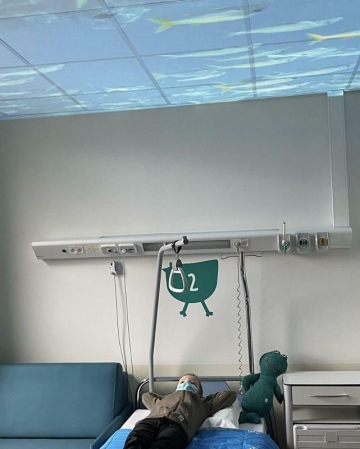AZ Diest first Belgian hospital to use Qwiek.up in pediatrics department - an audiovisual experience during care moments

The Dutch company Qwiek develops care support products that make care moments an experience for patients. In Belgium, the Qwiek.up is already being used in residential care centers as a welfare activity. But now it will also be used for the first time in a Belgian pediatrics department to provide appropriate distraction during examinations.
The Dutch company Qwiek develops care support products that make care moments an experience for patients. In Belgium, the Qwiek.up is already being used in residential care centers as a welfare activity. But now it will also be used for the first time in a Belgian pediatrics department to provide appropriate distraction during examinations.
AZ Diest first Belgian hospital to use Qwiek.up in pediatrics department - an audiovisual experience during care moments
The Dutch company Qwiek develops care support products that make care moments an experience for patients. In Belgium, the Qwiek.up is already being used in residential care centers as a welfare activity. But now it will also be used for the first time in a Belgian pediatrics department to provide appropriate distraction during examinations.
The Qwiek.up was originally developed for elderly care to calm people with dementia through various experience modules. And it has been used for this purpose for some time in Belgian residential care centers and geriatric departments.But this device has now also found its way for the first time into a Belgian pediatrics department to relax or distract children during examination moments.
AZ Diest's pediatrics department has recently started using the Qwiek.up for wound care or when placing an infusion or stomach tube, for example. "By projecting one of the experience modules on the ceiling or wall, the little patients are distracted from a painful care procedure," explains head nurse Carolien Smeyers of the pediatrics department. With images of an underwater world, the Efteling or bubbles, the pediatrics patients at AZ Diest find the necessary distraction during their examination. "The idea is that the children are less anxious during medical procedures," Carolien continues, "and that they become completely absorbed in the video so that they experience less pain and are less aware of what we are doing." And that seems to work. The images of the Efteling in particular are a success, both with the young patients and the teenagers.
This first is mainly thanks to the Round Table and Ladies' Circle Diest. Thanks to their sponsorship, the purchase of the device worth € 5,000 was made possible.
Latest insights & stories

A Global Movement: The World Unites in a Pink Pledge for Clean and Sustainable Water
5,000 participants. 32 countries. €30,000 funds raised. And that's just the beginning.
Picture this: One step that sends ripples across the globe, transforming lives and creating waves of change. You might wonder, how can such a simple action for most of us have such a profound impact?

Sustainability and circularity in construction
Join us in transforming the future of construction, creating buildings that not only stand the test of time but also contribute to a healthier planet!

RainTunes: Shower scenarios for the soul
Light, hearing, smell, and touch: Together with experts, we have developed sensuous scenarios that turn showering into an individual experience. Whether you want to prepare for the day ahead or relax after working out. Whether you want to refresh after a day’s work or unwind at the end of the evening: RainTunes surprises with multisensory experiences.*
*Currently available only in Germany and Austria.